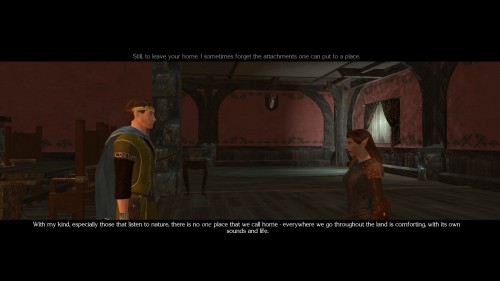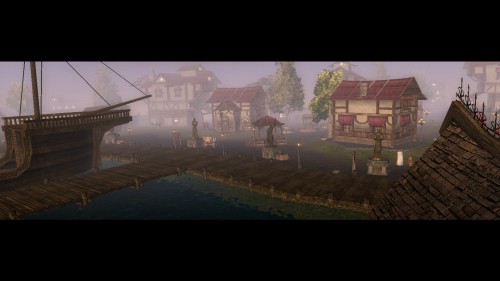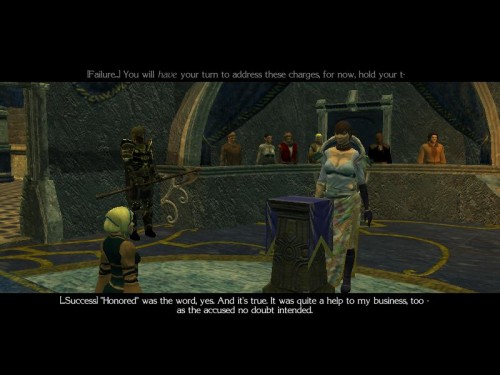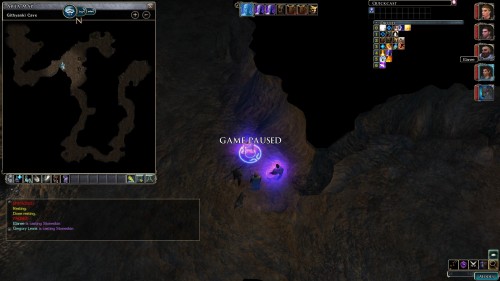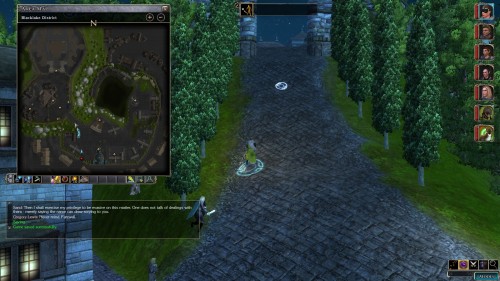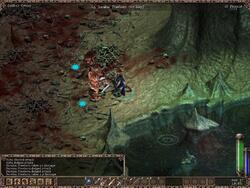TNO Reviews Neverwinter Nights 2
TNO Reviews Neverwinter Nights 2
Review - posted by Jaesun on Wed 21 September 2011, 18:29:46
Tags: Neverwinter Nights 2; Obsidian EntertainmentTNO has written up another review, and this time he did not like Neverwinter Nights 2:
Read the review here.
For an Obsidian game, NWN2 has a remarkably BioWarean pedigree. Not only in the structure and the plotting (the '4 quest hub design has been linearized, but the tutorial + linear segment before the game opens out is still there, DA:Os plot bears remarkable similarity to Act 3, etc.), but also in the gameplay: the gradual wasting away of non-combat options, the rise of 'pick up token and kill enemies' sidequests, the dumbing down of combat to a difficulty slider between 'easy' and 'tedious', and the confusion between 'playing it safe' and smearing everything in generica.
NWN2's small archipelago of interesting features are drowned in a sea of the forgettable, the poorly executed, and the pervasive sense that you've done this all before (and done better, too). Avoid wasting 30 hours of your time on this game.
NWN2's small archipelago of interesting features are drowned in a sea of the forgettable, the poorly executed, and the pervasive sense that you've done this all before (and done better, too). Avoid wasting 30 hours of your time on this game.
Read the review here.
Neverwinter Nights 2 (NWN2) was Obsidian's attempt at fantasy blockbuster. It reviewed well, retains several years after its release an active modding scene and prompted two expansions, Mask of the Betrayer and Storm of Zehir. How well does it stack up?
NARRATIVE
It is hard for a plot to be more derivative than NWN2. You are an orphan, brought up by a distant foster carer in a backward harbor town. Your simple life is turned upside when strange raiders come. It transpires that you are the chosen one, set to fetch the plot coupons (shards) to make the mcguffin (fancy sword) to save the world from the big bad evil now awakening (King of Shadows).
Things could have been much better than this. The back-story about the obligatory ancient lost empire was actually pretty interesting, and the big bad antagonist has a better development then his villain-generica 'king of shadows' name suggests. The game also manages to string you along nicely plot-wise for most of the first act with a churning pot of factions and interests at play. Sadly these features fade as the game progresses, and the plot becomes the engine to drive you along ever more contrived fetch and kill quests.
The characters by and large follow a similar timbre of squandered opportunity and feeble generica. Here are the first few NPCs, in order of appearance:
Kelgar: A dwarf fighter. He likes drinking, and brawling. Hilariously, he wants to be a monk because some of them beat him up in a fist fight.
Neeshka: A tiefling thief. Amoral, kleptomaniac, bitchy.
Elanee: A elf druid. Broadly sympathetic, dislikes cities. Comes from a strange wood.
Qara: A human sorcerer. Powerful, petulant, and acid tongued. Redhead.
Note that the subsequent sentences are pretty unnecessary: the entire character concept is captured in "Dwarf fighter" or "thief" or "sorcerer". The attempts to add wrinkles to the well-worn stereotypes fail either because the character is so silly you cannot take their development seriously (eg. Kelgar), or simply not developed enough (Elanee's "Mere of Dead men" never properly gets rolling, and Qara's uber but dangerous power is never properly shown). The quality of the party NPCs picks up a bit later (Amon Jerro and Bishop are relative highlights), but they can also be hobbled by the plot: most egregious are Bishop's poorly explained heel turns at the close.
Speaking of the end, NWN2 borrows KOTOR2's planned mechanic of having the party implode on itself in an orgy of back-biting and betrayal. Sadly, the aforementioned problems come back with a vengeance. If you got more influence with Qara the petulant sorcerer than Sand the smarmy mage, Sand will turn traitor against you because the big bad King of Shadows is 'less of a threat' than petulant sorcerer (and, to pile on the implausibility, siding with the guy who wants to kill everyone is going to sort this problem out). Whatever happens, Bishop will betray you, for no readily discernible reason, and, depending on influence, drag party members with him. To top it all, the good-guy ending is exactly as bad as 'rocks fall, everyone dies'.
LOOK, SOUND, AND FEEL
NWN2 uses an upgraded version of the Aurora engine. Although it is tricked out to look a bit better than KOTOR (the spell effects are particularly nice), it still leaves you with the impression that this generation of 3D engines simply do not match the eye candy of isometric background and sprites of the golden days of yore. There are a couple of nice touches (such as the animated skyboxes), but there is nothing especially striking going on and the art direction is pretty nondescript - if anything, it makes Faerun even more generic fantasy kitsch than before. Even BG2 had the odd pretty floor plan to look at.
Similar remarks apply to the sound. You have the standard repertoire of location - leitmotif and portentous hush music that seems to be standard fare, and the soundtrack is pretty indistinguishable from KOTOR's. The game wisely avoids full VO, and the voice-overs are generally competently done, considering the variable quality of the dialogue. To be honest though, I clicked through most of it as 'fetch this' quest filler.
QUEST DESIGN
NWN2 suckles ravenously from the teat of contrived busywork, and the game is bloated with the stuff. The best example is in act 1. The sage you need to speak to about the Mcguffin is in the section of the city locked down because of a spate of recent murders (this section is also the administrative center so locking it down is a mite implausible, but the plot takes greater liberties with your suspension of belief). To get inside, you have to pull favors for either the watch or the shadow thieves. This 'random obstacle but go fetch for me for some arbitrary number of quests and I'll remove it for you' design stank in BG2, and NWN2 decides that you cannot have too much of a bad thing. To get the watch to let me in, I needed to protect a merchant, stop a local thug, then go on a sweep to stop the dodgy watchmen. Then I needed to get a weapons shipment (rolling trash mobs), then raid a warehouse (rolling more irritating mobs), and then I had to protect an informant. Then I had to go off into the countryside to save Old Owl Well for the city, which involved crushing some orcs and recovering a friendly emissary. Then, after getting back, I had to kill off some mobs by the port. Then, and only then, would the Watch let me go see the Sage. There are no options to bargain ("come on, I just want to visit someone there! You can keep a guard with me!"), and there are no options of trying to sneak inside. Infuriating does not do this justice.
This is what happens if you side with the Watch - maybe the designers would have the thieves get you in for little incident and so muddy the waters a bit (which would neatly tie in for various occasions where the great and good of Neverwinter are transparently using you for their benefit). But no. Work for the thieves instead and you do cosmetically different quests in exactly the same environments in a marginally different order. This is not the only time Obsidian liberally abuse this quest structure: the 'frob the N pillars in the ruins (each in their own mini dungeon of trash mobs)' is another example.
It is remarkable just how many cheap narrative propulsion devices Obsidian deploys in NWN2. We have the contrivance of arriving at just the right time to stop a raid in progress or similar and thus get the next map location or whatever to keep on trucking (Githyenki library raid). Or you recover a particular NPC after a battle only to have them abducted or killed in a cut-scene (Sandra). Or the game just dumps narrative on you via some convenient NPC who just tells you what to do - "I got told to pass a message on to you, go to NPC X to progress the plot, Kthxbai" (Wolf after the trial). Or an NPC comes to an important breakthrough just as you'd run out of things to do (Sage, act 3). Worst of all are the shards you need to collect, which serve as ready McGuffins to kick the plot along when it runs out of steam ("Look, protagonist! There's a rumor that there's a shard over there! Go fetch!"). Challenges in RPGs should evolve naturally out of the story, not tacked on in innumerable abuses of the player's good faith. NWN2, as far as I can tell, always takes the latter over the former.
GAMEPLAY
No matter your character, you will solve the bulk of your problems by killing things. There are, as far as I can tell, no stealth options worth talking about. The talky skills are basically interchangeable (either bluff, diplomacy or intimidate usually give the same result), and also lead to frankly marginal gains.
There are two decent exceptions. One fairly neat resource management minigame is the Castle you get to play with, evidently taking the 'haven' approach and running with it. It ultimately has little importance to the plot, but if you are the sort of person who likes tinkering with your character, you will probably like tinkering with your Castle and upgrading it. Added bonuses are the sense of 'going up in the world' it gives, and being a partial cash sink for the nigh-endless funds you get later on.
The other is a massive trial scene. You are falsely accused, and you have to gather evidence and clear your name. The game does lead you by the nose to get all the evidence, and of course most of the evidence is scattered in mini dungeons with n trash mobs to kill, but jousting with the prosecutor (Torio, one of the aforementioned fairly good characters) and turning the witnesses against her is jolly well done, as is trying to recover when she pulls surprises on you, as is the slightly delayed success/fail feedback so you do not necessarily know whether you are 'winning' or just digging yourself a bigger hole. This would probably be the best bit of NWN2.
Too bad the whole thing is irrelevant. It turns that in this trial, the loser of a case can demand trial by combat. So, if you win the case, Torio demands trial by combat, and so you have to squick her chosen thug in one on one. If you lose the case, your adviser has a sudden flash of insight and demands trial by combat for you, which leads to you… having to fight that thug in one on one. This defeats the point previous hour or two of questing (not to mention the 20 or so minute trial itself), is objectively implausible, and further shafts talky characters - this is pretty much their only chance to shine, but they are funneled into the combat pit either way. The motive of ensuring meat-heads can survive is reasonable, but there are better ways than making the entire trial an elaborate preamble to a combat encounter.
COMBAT
Given most of the game is combat, what is it like? NWN2 uses the 3.5E dungeons and dragons rules, slightly bowdlerized and phase based for computer-gaming, but otherwise pretty much transcribed from the player's handbook. The phasing works far better than most RTwP offerings (although the camera is rubbish). The defects of 3.5E D&D are likely well known to the codex: that everything scales badly, mid-level on up becomes a mage fest, the magic item Monty haul system, the ease you can twink out characters etc. Design decisions and encounter balance amplify these faults further and sprinkle in a few of their own.
The first problem is the spells. Combat switches from 'passable' to 'irritating formality' at about the time you learn 4th level spells (which you get around the middle of act one). Primarily, this is because of stoneskin, which gives you DR 10/whatever and a nice big pool of damage to absorb before you lose the buff. This now immunizes you from trash mobs, broadly defined as any creature that does not cast spells and cannot reliably hit for more then 30 damage (these foes are approximately 80-85% of the total faced through the game). So my tactic became casting this spell (+misc other buffs) on my fighters and walking them into the enemy to kill them all. If the buffs ran out, I back tracked so I was far enough away from opponents for the game to let you rest (which takes 5 seconds and restores all hp, spells, item charges, and negates most status effects), recast the buffs, and repeated. The only problems were when I got complacent and walked into a load of casters without my buffs on.
The next problem, as you can guess, is the rest mechanic. Given replenishing your spells is never more than short walk and a button press away, I started dumping my fighters and filling my party with spell casters. The mage gang on party duels which were previously vaguely interesting and challenging also became formalities: whilst the enemy spent their first round buffing or shooting off fairly weak save-or-else spells, my party, with buffs ready made, would instead hurl out 250+ direct damage every six seconds, which would kill all the bad guys (naturally, if I was facing non-spellcasters, they all died whilst walking to my party). It was more than a mite anti climatic for the "I am hard-to-pronounce-name, plucked from the 7th circle of hell to hunt you down!" creature who bashes down the door with his demon retinue to be killed in exactly two rounds of spell spam, or for you wiping out a coven of evil clerics at the end of a dungeon in one.
D&D is also horribly broken, of course, so in this Obsidian are just following their franchise. The problem is the design choices (especially rest use) grossly exaggerate the problems. The rest mechanic in this game means any outcome from an encounter that is not a party wipe is as good as any other. This renders traps obsolete (oh no! I lost half my health bar, I'll have to press R again!) and most healing irrelevant. It also strips away the fig-leaf of balance from resource management: in bigger dungeons, there would be a worry of the trash mobs draining item charges, spell slots and other resources, and so there would be some value in navigating these encounters carefully. In NWN2, the trash mob encounters (and there are a lot of trash mob encounters) have no other purpose other than to spin out time and try your patience. You will survive, and the question is whether you can be bothered hitting r and recasting buffs, or pressing on at (marginally) reduced effectiveness.
Besides rest use being surely how the designers intended the game to be played (should I dump 1000 gold each time a party member drops to LARP a resurrection cost too?) This is not a case of the game having one hidden mechanic that breaks it. Any vaguely coherent attempt to build a character or play strategically breaks the game. You still have more than enough spells to spam the difficult encounters to death - you just have to suffer more through the no-risk trash mobs. Thinking "I'll try and make a tank, so I'll try and stack as many AC enhancers as I can" can net you mid game characters with AC around 35-40 - effectively untouchable. If you think direct damage is uncouth, you can make your spell-slinger throw save-or-dies which mean 'die' for all mobs besides the bosses that are immune. And so on ad nauseum.

The druid tank is probably sufficient to solo most encounters in the game, but you get at least three other characters too.
But if you find some way of handicapping yourself in a manner that doesn't make the combat a walkover, you won't be taken to the holy grail of entertainment. The bulk of the fighting will still comprise of smacking down small groups of unimpressive beaters. The occasional set pieces tend to be hobbled by poor AI, especially with spell casting (the mage duels of BG2 aren't to be found here).
CONCLUSION
For an Obsidian game, NWN2 has a remarkably BioWarean pedigree. Not only in the structure and the plotting (the '4 quest hub design has been linearized, but the tutorial + linear segment before the game opens out is still there, DA:Os plot bears remarkable similarity to Act 3, etc.), but also in the gameplay: the gradual wasting away of non-combat options, the rise of 'pick up token and kill enemies' sidequests, the dumbing down of combat to a difficulty slider between 'easy' and 'tedious', and the confusion between 'playing it safe' and smearing everything in generica.
NWN2's small archipelago of interesting features are drowned in a sea of the forgettable, the poorly executed, and the pervasive sense that you've done this all before (and done better, too). Avoid wasting 30 hours of your time on this game.
NARRATIVE
It is hard for a plot to be more derivative than NWN2. You are an orphan, brought up by a distant foster carer in a backward harbor town. Your simple life is turned upside when strange raiders come. It transpires that you are the chosen one, set to fetch the plot coupons (shards) to make the mcguffin (fancy sword) to save the world from the big bad evil now awakening (King of Shadows).
Things could have been much better than this. The back-story about the obligatory ancient lost empire was actually pretty interesting, and the big bad antagonist has a better development then his villain-generica 'king of shadows' name suggests. The game also manages to string you along nicely plot-wise for most of the first act with a churning pot of factions and interests at play. Sadly these features fade as the game progresses, and the plot becomes the engine to drive you along ever more contrived fetch and kill quests.
The characters by and large follow a similar timbre of squandered opportunity and feeble generica. Here are the first few NPCs, in order of appearance:
Kelgar: A dwarf fighter. He likes drinking, and brawling. Hilariously, he wants to be a monk because some of them beat him up in a fist fight.
Neeshka: A tiefling thief. Amoral, kleptomaniac, bitchy.
Elanee: A elf druid. Broadly sympathetic, dislikes cities. Comes from a strange wood.
Qara: A human sorcerer. Powerful, petulant, and acid tongued. Redhead.
Note that the subsequent sentences are pretty unnecessary: the entire character concept is captured in "Dwarf fighter" or "thief" or "sorcerer". The attempts to add wrinkles to the well-worn stereotypes fail either because the character is so silly you cannot take their development seriously (eg. Kelgar), or simply not developed enough (Elanee's "Mere of Dead men" never properly gets rolling, and Qara's uber but dangerous power is never properly shown). The quality of the party NPCs picks up a bit later (Amon Jerro and Bishop are relative highlights), but they can also be hobbled by the plot: most egregious are Bishop's poorly explained heel turns at the close.
Speaking of the end, NWN2 borrows KOTOR2's planned mechanic of having the party implode on itself in an orgy of back-biting and betrayal. Sadly, the aforementioned problems come back with a vengeance. If you got more influence with Qara the petulant sorcerer than Sand the smarmy mage, Sand will turn traitor against you because the big bad King of Shadows is 'less of a threat' than petulant sorcerer (and, to pile on the implausibility, siding with the guy who wants to kill everyone is going to sort this problem out). Whatever happens, Bishop will betray you, for no readily discernible reason, and, depending on influence, drag party members with him. To top it all, the good-guy ending is exactly as bad as 'rocks fall, everyone dies'.
LOOK, SOUND, AND FEEL
NWN2 uses an upgraded version of the Aurora engine. Although it is tricked out to look a bit better than KOTOR (the spell effects are particularly nice), it still leaves you with the impression that this generation of 3D engines simply do not match the eye candy of isometric background and sprites of the golden days of yore. There are a couple of nice touches (such as the animated skyboxes), but there is nothing especially striking going on and the art direction is pretty nondescript - if anything, it makes Faerun even more generic fantasy kitsch than before. Even BG2 had the odd pretty floor plan to look at.
Similar remarks apply to the sound. You have the standard repertoire of location - leitmotif and portentous hush music that seems to be standard fare, and the soundtrack is pretty indistinguishable from KOTOR's. The game wisely avoids full VO, and the voice-overs are generally competently done, considering the variable quality of the dialogue. To be honest though, I clicked through most of it as 'fetch this' quest filler.
QUEST DESIGN
NWN2 suckles ravenously from the teat of contrived busywork, and the game is bloated with the stuff. The best example is in act 1. The sage you need to speak to about the Mcguffin is in the section of the city locked down because of a spate of recent murders (this section is also the administrative center so locking it down is a mite implausible, but the plot takes greater liberties with your suspension of belief). To get inside, you have to pull favors for either the watch or the shadow thieves. This 'random obstacle but go fetch for me for some arbitrary number of quests and I'll remove it for you' design stank in BG2, and NWN2 decides that you cannot have too much of a bad thing. To get the watch to let me in, I needed to protect a merchant, stop a local thug, then go on a sweep to stop the dodgy watchmen. Then I needed to get a weapons shipment (rolling trash mobs), then raid a warehouse (rolling more irritating mobs), and then I had to protect an informant. Then I had to go off into the countryside to save Old Owl Well for the city, which involved crushing some orcs and recovering a friendly emissary. Then, after getting back, I had to kill off some mobs by the port. Then, and only then, would the Watch let me go see the Sage. There are no options to bargain ("come on, I just want to visit someone there! You can keep a guard with me!"), and there are no options of trying to sneak inside. Infuriating does not do this justice.
This is what happens if you side with the Watch - maybe the designers would have the thieves get you in for little incident and so muddy the waters a bit (which would neatly tie in for various occasions where the great and good of Neverwinter are transparently using you for their benefit). But no. Work for the thieves instead and you do cosmetically different quests in exactly the same environments in a marginally different order. This is not the only time Obsidian liberally abuse this quest structure: the 'frob the N pillars in the ruins (each in their own mini dungeon of trash mobs)' is another example.
It is remarkable just how many cheap narrative propulsion devices Obsidian deploys in NWN2. We have the contrivance of arriving at just the right time to stop a raid in progress or similar and thus get the next map location or whatever to keep on trucking (Githyenki library raid). Or you recover a particular NPC after a battle only to have them abducted or killed in a cut-scene (Sandra). Or the game just dumps narrative on you via some convenient NPC who just tells you what to do - "I got told to pass a message on to you, go to NPC X to progress the plot, Kthxbai" (Wolf after the trial). Or an NPC comes to an important breakthrough just as you'd run out of things to do (Sage, act 3). Worst of all are the shards you need to collect, which serve as ready McGuffins to kick the plot along when it runs out of steam ("Look, protagonist! There's a rumor that there's a shard over there! Go fetch!"). Challenges in RPGs should evolve naturally out of the story, not tacked on in innumerable abuses of the player's good faith. NWN2, as far as I can tell, always takes the latter over the former.
GAMEPLAY
No matter your character, you will solve the bulk of your problems by killing things. There are, as far as I can tell, no stealth options worth talking about. The talky skills are basically interchangeable (either bluff, diplomacy or intimidate usually give the same result), and also lead to frankly marginal gains.
There are two decent exceptions. One fairly neat resource management minigame is the Castle you get to play with, evidently taking the 'haven' approach and running with it. It ultimately has little importance to the plot, but if you are the sort of person who likes tinkering with your character, you will probably like tinkering with your Castle and upgrading it. Added bonuses are the sense of 'going up in the world' it gives, and being a partial cash sink for the nigh-endless funds you get later on.
The other is a massive trial scene. You are falsely accused, and you have to gather evidence and clear your name. The game does lead you by the nose to get all the evidence, and of course most of the evidence is scattered in mini dungeons with n trash mobs to kill, but jousting with the prosecutor (Torio, one of the aforementioned fairly good characters) and turning the witnesses against her is jolly well done, as is trying to recover when she pulls surprises on you, as is the slightly delayed success/fail feedback so you do not necessarily know whether you are 'winning' or just digging yourself a bigger hole. This would probably be the best bit of NWN2.
Too bad the whole thing is irrelevant. It turns that in this trial, the loser of a case can demand trial by combat. So, if you win the case, Torio demands trial by combat, and so you have to squick her chosen thug in one on one. If you lose the case, your adviser has a sudden flash of insight and demands trial by combat for you, which leads to you… having to fight that thug in one on one. This defeats the point previous hour or two of questing (not to mention the 20 or so minute trial itself), is objectively implausible, and further shafts talky characters - this is pretty much their only chance to shine, but they are funneled into the combat pit either way. The motive of ensuring meat-heads can survive is reasonable, but there are better ways than making the entire trial an elaborate preamble to a combat encounter.
COMBAT
Given most of the game is combat, what is it like? NWN2 uses the 3.5E dungeons and dragons rules, slightly bowdlerized and phase based for computer-gaming, but otherwise pretty much transcribed from the player's handbook. The phasing works far better than most RTwP offerings (although the camera is rubbish). The defects of 3.5E D&D are likely well known to the codex: that everything scales badly, mid-level on up becomes a mage fest, the magic item Monty haul system, the ease you can twink out characters etc. Design decisions and encounter balance amplify these faults further and sprinkle in a few of their own.
The first problem is the spells. Combat switches from 'passable' to 'irritating formality' at about the time you learn 4th level spells (which you get around the middle of act one). Primarily, this is because of stoneskin, which gives you DR 10/whatever and a nice big pool of damage to absorb before you lose the buff. This now immunizes you from trash mobs, broadly defined as any creature that does not cast spells and cannot reliably hit for more then 30 damage (these foes are approximately 80-85% of the total faced through the game). So my tactic became casting this spell (+misc other buffs) on my fighters and walking them into the enemy to kill them all. If the buffs ran out, I back tracked so I was far enough away from opponents for the game to let you rest (which takes 5 seconds and restores all hp, spells, item charges, and negates most status effects), recast the buffs, and repeated. The only problems were when I got complacent and walked into a load of casters without my buffs on.
The next problem, as you can guess, is the rest mechanic. Given replenishing your spells is never more than short walk and a button press away, I started dumping my fighters and filling my party with spell casters. The mage gang on party duels which were previously vaguely interesting and challenging also became formalities: whilst the enemy spent their first round buffing or shooting off fairly weak save-or-else spells, my party, with buffs ready made, would instead hurl out 250+ direct damage every six seconds, which would kill all the bad guys (naturally, if I was facing non-spellcasters, they all died whilst walking to my party). It was more than a mite anti climatic for the "I am hard-to-pronounce-name, plucked from the 7th circle of hell to hunt you down!" creature who bashes down the door with his demon retinue to be killed in exactly two rounds of spell spam, or for you wiping out a coven of evil clerics at the end of a dungeon in one.
D&D is also horribly broken, of course, so in this Obsidian are just following their franchise. The problem is the design choices (especially rest use) grossly exaggerate the problems. The rest mechanic in this game means any outcome from an encounter that is not a party wipe is as good as any other. This renders traps obsolete (oh no! I lost half my health bar, I'll have to press R again!) and most healing irrelevant. It also strips away the fig-leaf of balance from resource management: in bigger dungeons, there would be a worry of the trash mobs draining item charges, spell slots and other resources, and so there would be some value in navigating these encounters carefully. In NWN2, the trash mob encounters (and there are a lot of trash mob encounters) have no other purpose other than to spin out time and try your patience. You will survive, and the question is whether you can be bothered hitting r and recasting buffs, or pressing on at (marginally) reduced effectiveness.
"So don't abuse the rest mechanic, and stop munckining the rules, moron".
Besides rest use being surely how the designers intended the game to be played (should I dump 1000 gold each time a party member drops to LARP a resurrection cost too?) This is not a case of the game having one hidden mechanic that breaks it. Any vaguely coherent attempt to build a character or play strategically breaks the game. You still have more than enough spells to spam the difficult encounters to death - you just have to suffer more through the no-risk trash mobs. Thinking "I'll try and make a tank, so I'll try and stack as many AC enhancers as I can" can net you mid game characters with AC around 35-40 - effectively untouchable. If you think direct damage is uncouth, you can make your spell-slinger throw save-or-dies which mean 'die' for all mobs besides the bosses that are immune. And so on ad nauseum.

The druid tank is probably sufficient to solo most encounters in the game, but you get at least three other characters too.
But if you find some way of handicapping yourself in a manner that doesn't make the combat a walkover, you won't be taken to the holy grail of entertainment. The bulk of the fighting will still comprise of smacking down small groups of unimpressive beaters. The occasional set pieces tend to be hobbled by poor AI, especially with spell casting (the mage duels of BG2 aren't to be found here).
CONCLUSION
For an Obsidian game, NWN2 has a remarkably BioWarean pedigree. Not only in the structure and the plotting (the '4 quest hub design has been linearized, but the tutorial + linear segment before the game opens out is still there, DA:Os plot bears remarkable similarity to Act 3, etc.), but also in the gameplay: the gradual wasting away of non-combat options, the rise of 'pick up token and kill enemies' sidequests, the dumbing down of combat to a difficulty slider between 'easy' and 'tedious', and the confusion between 'playing it safe' and smearing everything in generica.
NWN2's small archipelago of interesting features are drowned in a sea of the forgettable, the poorly executed, and the pervasive sense that you've done this all before (and done better, too). Avoid wasting 30 hours of your time on this game.






